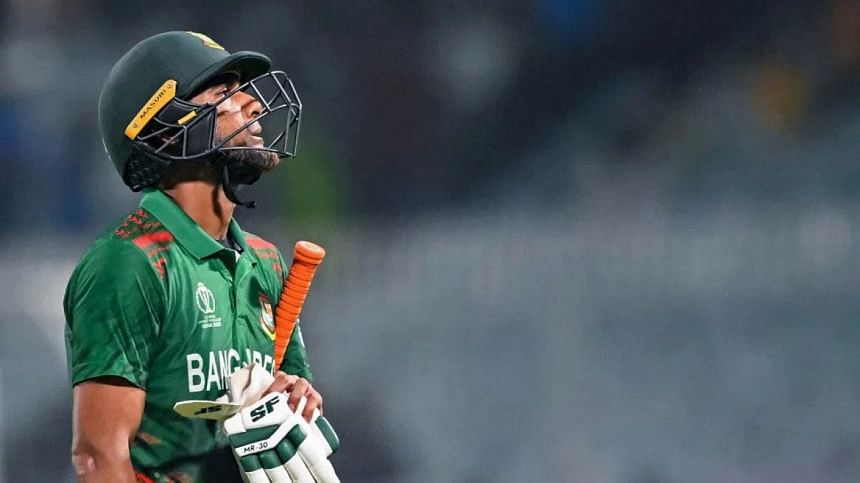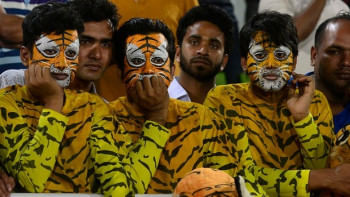What’s even the point of having a cricket team?

I know an octogenarian whose wife passed away two years ago and most of his children have grown up and settled abroad. I happen to see this person once or twice a week, and while it's often difficult to find topics of common interest to have a conversation with him, I always try. The difficulties evaporate, however, whenever there's cricket on the TV. I love cricket, he loves cricket, and after we're done discussing the game for anywhere between 20 and 30 minutes, I like to think it makes both of our days a tiny bit more fulfilling.
So, is this the point of having a cricket team? Allowing fans to enjoy a sport they love, giving them a team they can get behind, and connecting people on the basis of a common interest are reasons enough to sponsor a sport on a national level. The reason cricket has become that sport in Bangladesh is because it gets the job done better than anything else. The national team and its sporadic successes count among some of the biggest "positive" national moments in the last two-three decades, giving us, as a nation, the confidence to expect more positive things from them.
Going forward, the lack of trust from cricket fans won't contain itself to the national team. The business of cricket may suffer, and this industry that has grown for the last two decades may start to shrink. The way out of that is progressive thinking, turning this top-down enterprise into one that is bottom-up.
But that's only part of the reason cricket is what it is in our country. The attention and the expectation surrounding cricket has commercialised the sport, and driven professionals to unprecedented levels of stardom. Shakib Al Hasan being the world's best all-rounder is good for Bangladeshi cricket, but it's great for the brands that he endorses. There is money to be made from having a cricket team and having people watch that team. The broadcasting fees alone that are charged by the Bangladesh Cricket Board (BCB), theoretically at least, trickles down to every level of cricket. Thousands of clubs and hundreds of thousands of young cricketers fight to ascend this spire. The closer they get to the pinnacle, the more glory awaits them. Cricket is an industry, and in Bangladesh, this industry is top-down. It's a business, and until recently, it was doing well.
Like any other business, this structure only works when each and every one of its components are functioning and healthy. Right now, however, cricket in Bangladesh is starting to seem like a dwindling trade. Those in the know would probably say that none of this was unexpected, but as a top-down industry, it does take some abysmal cricket on the part of the national team to get everyone's attention.
Bangladesh's loss against the Netherlands in the world cup is not going to gut the sport in our country, but it does get people asking questions. Trust has gone out of cricket in Bangladesh. Fans still like one or two cricketers; they might even fight each other over who is more deserving of the public's adoration, but very few people trust the team to go out there and give it their all. This breach of trust possibly began in the aftermath of the 2019 World Cup, but it definitely solidified in the lead-up to this world cup. The hope was that the team had isolated itself from all the noise, but as it turns out, it didn't.
Going forward, the lack of trust from cricket fans won't contain itself to the national team. The business of cricket may suffer, and this industry that has grown for the last two decades may start to shrink. The way out of that is progressive thinking, turning this top-down enterprise into one that is bottom-up. Investing in the grassroots, building up domestic leagues, giving domestic cricketers the means to pursue the sport they love while maintaining a sustainable and acceptable standard of life—these things will help. But knowing the trends in Bangladeshi cricket, the fixes that will be implemented after this world cup may well be short term.
Long-term fixes take a long time to work, and cricket as a business needs to bounce back quicker than that. A change in the coaching staff, maybe a new captain, some notable retirements, and a bunch of new players later, Bangladeshi cricket will definitely look very different after this world cup, but it's safe to say that it won't change fundamentally.
Here's the thing though, if the point of having a cricket team is to serve fans, this jig will be up at some point. Fans have limited patience, and cricket fans are being pushed dangerously close to the limit. But if the point is to keep the industry alive enough to make sure the shake-up never becomes seismic for those who make the big bucks from cricket, we are in for a whole lot more suffering.
Azmin Azran is the editor of Campus and Rising Stars at The Daily Star.
Views expressed in this article are the author's own.
Follow The Daily Star Opinion on Facebook for the latest opinions, commentaries and analyses by experts and professionals. To contribute your article or letter to The Daily Star Opinion, see our guidelines for submission.

 For all latest news, follow The Daily Star's Google News channel.
For all latest news, follow The Daily Star's Google News channel. 










Comments